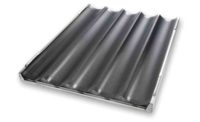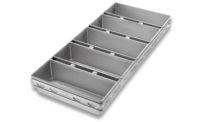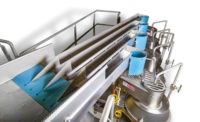Snack and bakery facilities have a daily need for thoroughly cleaning pans, trays, containers, utensils, equipment, parts, and more, especially anything that comes into contact with the finished product or human hands, in order to meet the needs of food safety programs, including mitigating contamination from allergens or pathogens. While COVID-19 has reintroduced the necessity of these daily steps, this attention paid to cleanliness and sanitization is nothing new for snack and bakery facilities, with the Food Safety Modernization Act (FSMA) significantly ramping it up over the past several years. And these days, trends like sustainability, automation, shortages of skilled labor, and customization increasingly factor into the discussion.
Top demands
Even before the pandemic, snack and bakery customers had begun to take a more in-depth look at food safety, and how they are cleaning and sanitizing their facilities on a daily basis, says Brad Sims, biologist and technical support specialist, food division, Madison Chemical Co., Madison, IN. “We partner with our customers to take a more-critical look at cleaning and sanitation practices,” he says. This involves taking a very in-depth look at the environment to see how that might contribute to sporadic issues. “A focus on prevention with proper cleaning and sanitation practices combined with a robust environmental monitoring program have taken the driver’s seat.”
Douglas Machines Corp., Clearwater, FL, sees three primary requests from customers when it comes to washing and sanitizing systems, says Darcel Schouler, marketing manager. They want consistency over repeated washings, effectiveness with consistently clean containers that will pass a swab test, and efficiency that provides labor, chemical, and energy savings.
“We now have a line of washers to clean pans and containers at a rate of hundreds to thousands per hour,” says Schouler. “We developed a line of washers for use in snack food manufacturing to reduce the production line changeover time for cleaning from hours to minutes. Going forward, our R&D engineers are currently working on some exciting new energy-saving systems, which we will debut in the next year.”
Snack and bakery facilities are also thinking more about personnel safety, says Conn Casey, sales manager, U.S. and Canada, Bex Engineering, Ltd., Mississauga, Ontario. He notes increased use of atomizing nozzles for disinfectant procedures for personnel. “People are looking for hydraulic or pressurized atomizing nozzles to keep people safe. That carries over to the whole food industry. People want the highest-quality products that are going to ensure safety and keep everything clean.”
Casey notes that customers are also looking for something special, something a little different that they can’t find online or in the catalog. “They’re asking for custom work,” he says.
ChemxWorks, San Diego, says its customers have always faced challenges finding enough skilled labor, which has been exacerbated by COVID-19, due to concerns about safety in the workplace and the fact that lower-paid workers might receive more in unemployment benefits than they had been for coming to work, says Gary Shifren, president.
And despite the pandemic, the demand for bakery and snack manufacturing has risen at grocery, Shifren says. “Bakeries have high volume and increased capacity, but they don’t want to have six people loading and unloading these units,” he says. There’s increased demand for washing systems, because bakeries sometimes look to minimize on labor.
New innovations
Douglas Machines offers washers that are hygienically designed to effectively clean and sanitize a variety of trays, molds, racks, proofing sheets, mixing bowls, sheet pans, and other containers used in snack and bakery facilities, Schouler says. “Whether it’s sticky residue from ingredients such as chocolate, molasses, or glazes, or allergen-related contaminants, container cleanup is quick and economical,” she says.
Douglas Machines has developed programmable logic controller (PLC) and human-machine interface (HMI) controls to enable washing systems to be integrated into the plant information center, with color touchscreen features and data-logging capabilities that give the user access to operational parameters like run-time, wash and rinse temperature, and pressure, Schouler says. Diagnostics can be analyzed to troubleshoot.
These features integrate the washing systems with the Internet of Things (IoT), providing staff and management the ability to analyze washing and sanitizing data before an issue areas, and also to give regulators the ability to analyze that same data as they inspect facilities, Schouler says. “The data tells them much more-specific information and can pinpoint issues,” she says.
The automation that Douglas Machines eliminates manual washing and sanitizing of reusable containers, creating labor and time savings, Schouler says. “Our machines free up facility workers to do more-important tasks,” she says. “Our pot, pan, and container washers have sheet pan capacities of 10 to 36 pans, as well as bucket washers with a capacity of up to 10 per batch. Rack washers can pump out up to 180 buckers per hour.”
Douglas Machines also has focused on sustainability, with a reduction in energy and waste consumption, as well as food waste, which “are not only better for the planet, but make good business sense,” Schouler says. “It is part of our overall commitment to delivering manufacturing sustainability savings through minimal water, chemicals, energy, and waste. It is an exciting way of creating value while lessening the negative impact on the environment.”
The company is also expanding into new business areas. Douglas Machines has been at the forefront of providing regulatory guidance and building washers to serve the expanding cannabis edibles market. “Processors, bakeries, and manufacturers are using our equipment to achieve maximum cleaning effectiveness for all types of containers, while avoiding issues that take their focus off revenue-generating responsibilities,” Schouler says. “Bakeries and food manufacturers working in the cannabis world rely on our washers to ensure totes, trays, tubs, and racks remain sanitized for reuse.”
Madison Chemical provides pan-washing systems, typically for aluminum baking pans and softer metals. Among the considerations is striking a chemical balance that both cleans the soil level present while protecting the equipment, Sims says. “We have a great line of low-foam, caustic cleaning to remove soils, oils, and greases that are typical for these types of operations,” he says. Madison Chemical’s ProClean Pan Wash is one of the “go-to” products in this area, he adds.
In addition to getting the chemistry on target, snack and bakery manufacturers need sanitizing solutions to fit their operation, Sims says. “We offer a range of sanitizers that will meet the needs of the equipment and the operation,” he says.
Madison also works with customers to try to abate water in areas of a plant where it’s not welcome while still offering microbial protection and cleaning capabilities. One approach uses its line of floor powders, like ProClean Floor Defense. “Foot-traffic control is incredibly important. It’s a great way to control the spread harmful microorganisms,” Sims says.
To address hard-to-reach areas like cracks and crevices, as well as “intricate parts that may not stand up to traditional chemistry,” Madison offers a line of neutral, enzyme-based cleaning solutions, Sims says. “These products are a great way to clean those tough-to-reach areas and sensitive pieces of equipment.”
On the snack food side, Madison has looked at additives for fryers to assist customers with effective equipment cleaning. Extended fryer run times can made it difficult to clean burnt-on oil, fat, and grease. “You’ve got to get that equipment back to clean to ensure you are producing the safest product of the highest quality,” Sims says. “That has been big for us, and big for our customer base.”
BEX Engineering provides a full line of spray, cone and atomizing nozzles, both hydraulic and air, to the snack and bakery industries, Casey says. “It’s a lot of tank washing, and low-flow atomizing and misting nozzles.”
BEX is always trying to expand this line and always willing to look at new ideas and potential for customization, Casey says. “For example, with our tank-washing line, we continue to expand that for customers in terms of the options.” This can include the size of tanks that can be cleaned, the force that’s used, whether it’s a 360-degree or 270-degree wash, different materials, sanitary connections, etc. “Because we are the manufacturer, we can make anything,” he says.
ChemxWorks offers the D-Carbonator system, which uses a proprietary, environmentally safe detergent, combined with hot water, to fight carbon buildup from fats, oils, and greases, Shifren says. Bakeries can’t afford carbon buildup, because it slows down their processes and lowers quality. “Their product actually deteriorates over time,” he says. Removing carbon buildup also prevents flakes of material from ending up in the baked goods.
The D-Carbonator improves both the efficiency and effectiveness, eliminating the tough elbow grease needed to clean pans and other bakery equipment manually, Shifren says. “You put in water, put in the enzyme, switch it on, and get it up to temperature,” he says. “It remains in the unit for a month at a time.” That saves greatly on water costs and boosts environmental sustainability, to go along with the reduced labor costs.
The D-Carbonator can clean any bakery equipment, with two different sizes: one designed to accommodate a double baking rack and the other for a single. “It becomes a one-person operation,” Shifren says. “You don’t have to have somebody scrubbing day-in and day-out. They can use those people elsewhere in the plant, in something that’s actually productive and helps them increase their bottom line.”








